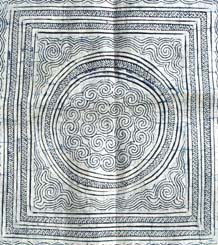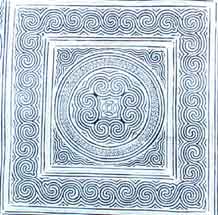
|
| home | site map | bibliographies | country | forum | links | studies | what's new | photogalleries | about us | |
|
 |
||
|
click
on enlargement to return to photogallery - click on thumbnails to go to
further enlargements |
| images ©
Pamela A Cross |
|
click
on enlargement above to return to photogallery - click on thumbnails below
to go to further enlargements |
| A
Ge Jia winter baby carrier in the collection of Pamela Cross which was
bought in Ma Tang village, Kaili city, Guizhou province in November 2001.
(See photogallery of Ma Tang village.) It is worked on a single piece
of yang bu (market bought machine made cotton).
Andrew Dudley commented on the forum that "although this style is quite common and has been produced for a number of generations up to the present day, the pattern in the centres of the three large upper circles could be reasonably old, say about 60 years old, although it would be almost impossible to say for sure even if seeing the original piece (often, the centres of these circles were left blank as the tying band would cover this area)." It is very
difficult indeed to photograph well as a whole textile as the design
is so fine. I am amazed at the control of the wax knife in carrying
out the geometry of three larger circles at the top of the rectangle
and smaller circumference circles on the other three sides (giving four
at the bottom). I would find this design challenging enough to draw
out with a pencil! The fineness of the scrolls over the whole baby carrier
is mind blowing particularly remembering that the white areas have been
covered in wax to resist the indigo dye and the dark lines are the result
of the cotton being left uncovered to receive the dye. |
|||||||||||
|
images ©
Pamela A Cross |
|
||||||||||
 |
 |
||||||||||
| Detail
from Pamela's Ge Jia winter wax resist baby carrier showing similarity
with the centre of one in the collection of Andrew Dudley to the far
right |
This
flower design wax resist Ge Jia winter baby carrier is in the collection
of Andrew Dudley. It is made of tu bu (hand spun and woven cotton cloth).
When purchased in 1998, this carrier was claimed to be about 90-100
years old, which Andrew feels is unlikely, but it could well be 60-70
years old - say second quarter of the 20th century. |
Detail
of a Ge Jia winter baby carrier in Andrew Dudley's collection illustrating
the use of similar flowing scrolls in the wax resist. Probably first
quarter of 20th century. |
|||||||||
|
|||||||||||
click
on enlargement to return to photogallery - click on thumbnails to go to
further enlargements |
||
| To access the Ge Jia threads from which this photogallery and associated material has been created go to the forum and click 'Search' - one of the top right hand buttons on the screen - and input 'Ge Jia' | ||
|
for further photogalleries of Ge Jia textiles see Ge Jia textiles: jackets and Ma Tang village, Kaili city |
|
| home
|
site map | bibliographies
| country | forum |
links | studies
|
what's new
| photogalleries | about
us | |
|
Copyright © 2012 Pamela A Cross. The contents of this site, including all images and text, are for personal, educational, non-commercial use only and may not be reproduced in any form without the express permission of Pamela A Cross. |
|
If
you have any comments
on the tribaltextiles.info website please send them to us. If you have
any general tribal textile comments or questions go to the tribaltextiles.info/community
forum to share your thoughts and questions with an international
community of enthusiasts. |
this
page last updated
22 May, 2006
|